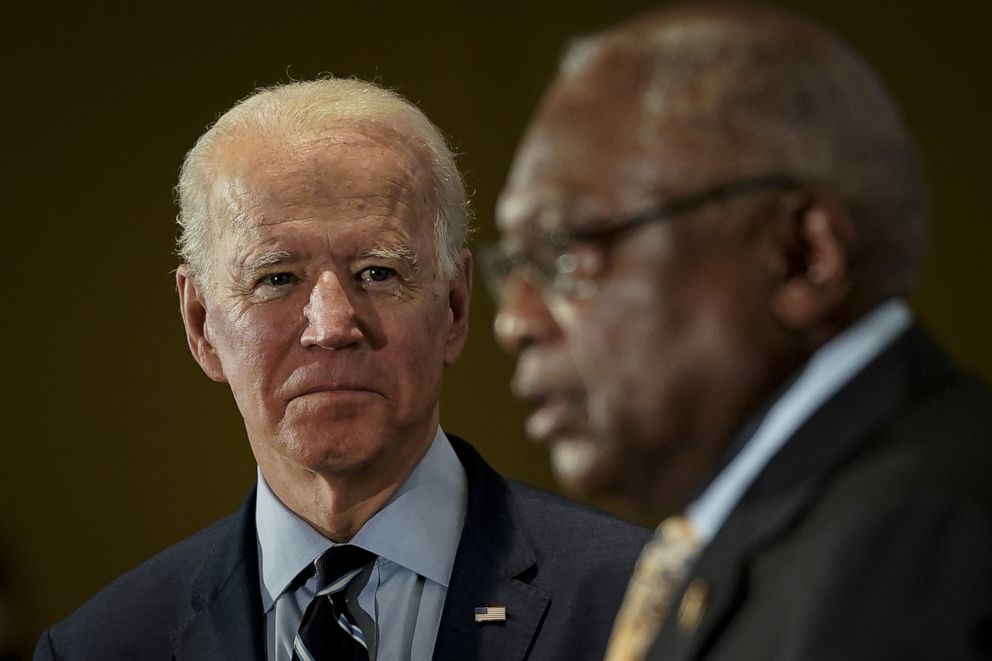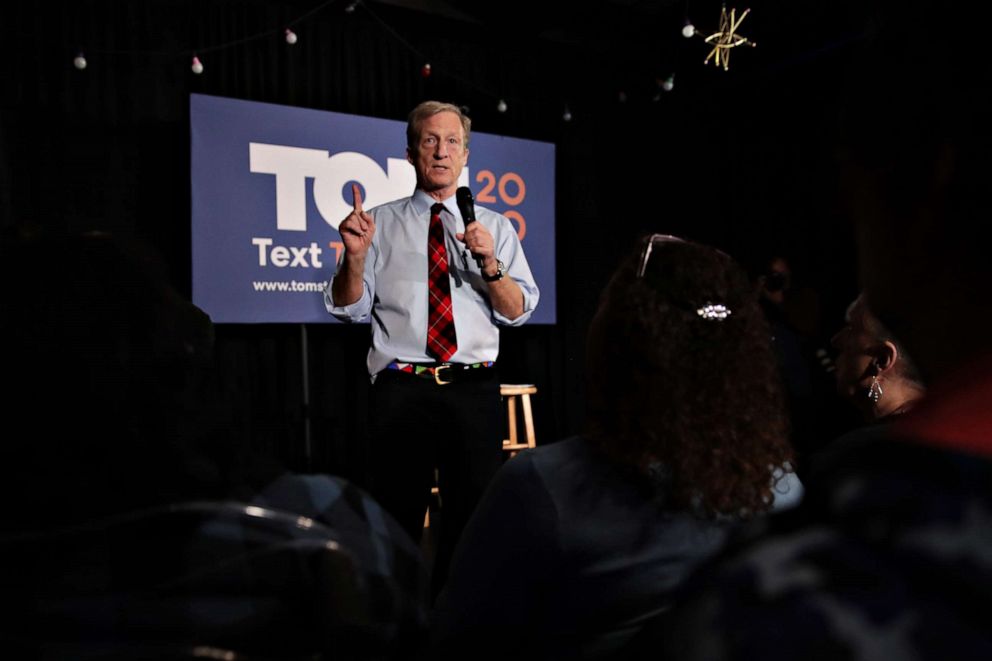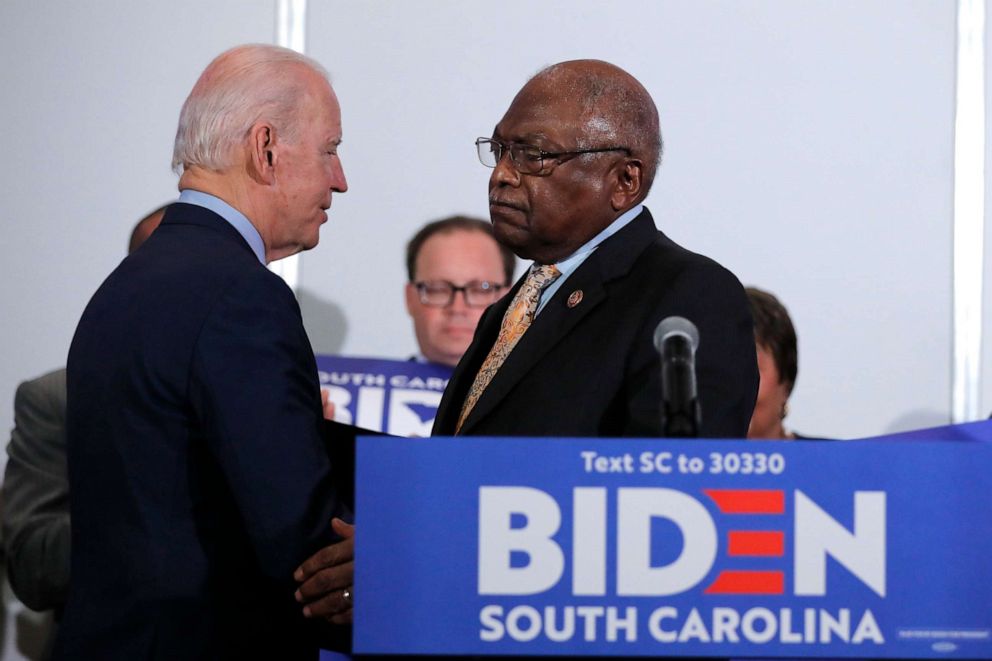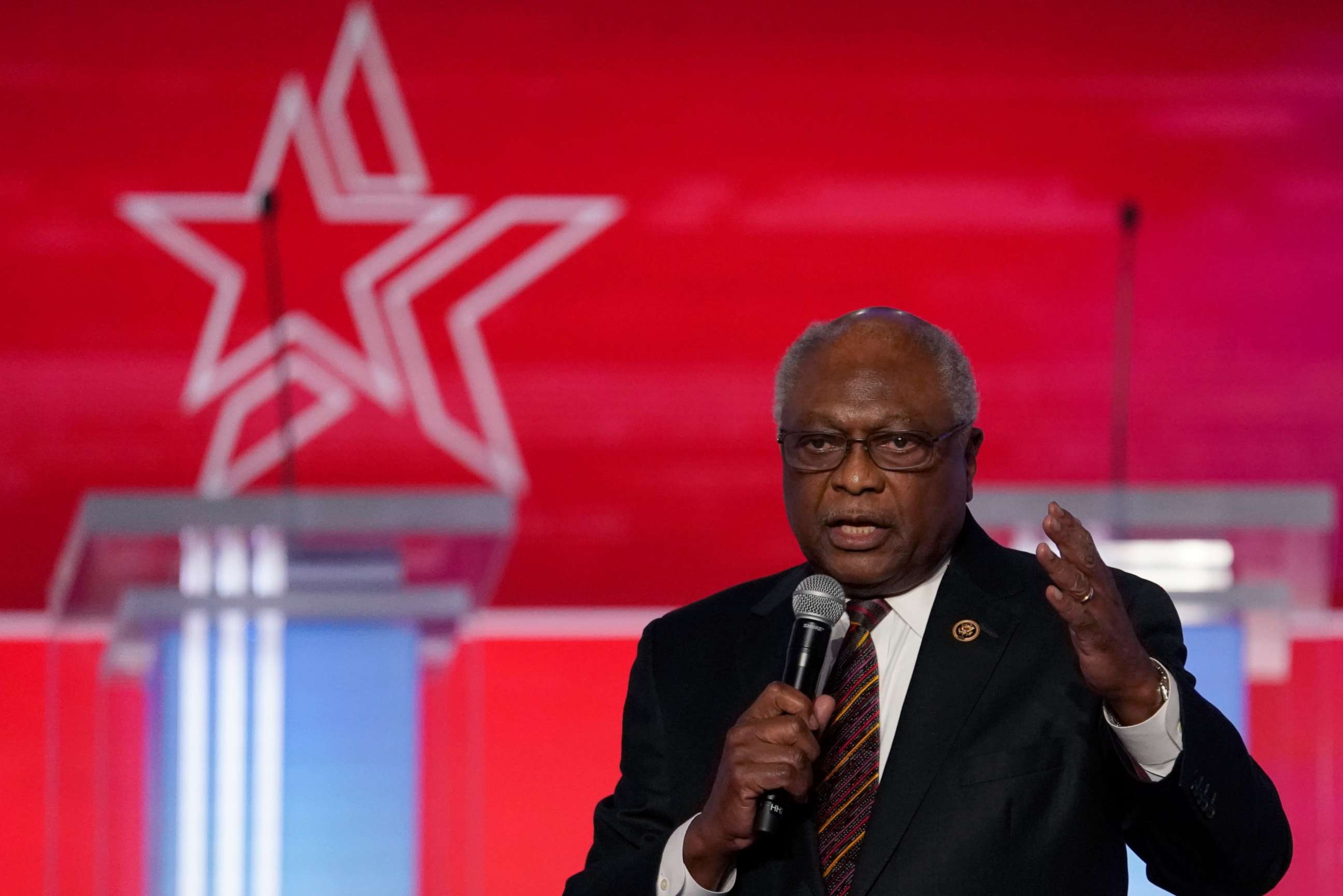SC Rep. Jim Clyburn: 'No question' Tom Steyer's taking support from Joe Biden
He added that he's "insulted by" claims Steyer is "buying" black support.
Rep. Jim Clyburn, perhaps the most important Democratic politician in South Carolina, said "there's no question" that businessman Tom Steyer has swooped up some of the support from former Vice President Joe Biden, ahead of the state's "first-in-the-South" primary.
"Oh, there's no question about that," Clyburn told "Powerhouse Politics," when asked if Steyer was taking away support from Biden, whom the South Carolina lawmaker formally endorsed on Wednesday.
Back in October, Biden was supported by 46% of African American Democratic and Democratic-leaning voters in South Carolina, according to a poll from Winthrop University. In the school's latest poll, released this month, Biden had only 31% support among the same group, and 18% supported Steyer.
According to 2016 exit polls, black voters accounted for around 60% of the electorate in the South Carolina Democratic primary.
Steyer, a billionaire who's mostly self-funded his campaign, has had a clear focus on South Carolina during his campaign. According to ad data analysis from CMAG/Kantar Media, he's spent more than $22 million on advertising in South Carolina. The only state he's spent more money in is California, which has the most pledged delegates up for grabs and a population nearly eight times greater.

But even though he's spent a lot of money on advertising, and has also hired black politicians and political operatives in the state to work on his campaign, Clyburn said he finds it insulting to say Steyer's "buying" black support, which some -- including Biden surrogate state Sen. Dick Harpootlian -- have claimed.
"If you go out and contract with a black group to do your get-out-the-vote stuff, to run your field operation -- that's what they do," Clyburn told ABC News Political Director Rick Klein. "When people have certain levels of expertise, they're right to get paid for that expertise. And so I'm insulted by this, people talking about you’re buying votes when you hire people to do what they know how to do."
The only candidate who has made more trips to South Carolina is Sen. Bernie Sanders, but Steyer got into the race nearly five months after the Vermont Independent. On Monday, speaking at the "First in the South" dinner, Steyer pledged to return to the Palmetto State win-or-lose.
"One of the people who is endorsing me said, 'Tom, I don't want to endorse you if you're just going to come and ask for votes and leave.'" he said, capturing the attendees' attention by zeroing in on communities in need of revitalization and mentioning local activists by name. "And I said, 'I promise you, I have been fighting on these issues for decades. The fight is still going to go on. I'm going to be in it.'"

He added, "Win, lose or draw ... I'm going to be in South Carolina, because I've met the people here. I've gone around and seen what's going on. You guys own my heart. I'm not walking away from South Carolina."
Steyer's increased support is one of the reasons Clyburn decided to endorse before the primary, telling Klein, "I want people to know that it ain’t over 'til it’s over."
But one of the main driving forces behind his decision was his late wife of nearly 60 years, Emily, who passed away in September.
"We talked about this campaign. We talked about the future of this country. We talked about who we thought would be the best person to be president, the best person to take on [President] Donald Trump," Clyburn, the House majority whip, said on "Powerhouse Politics. "And we felt very strongly that it was Joe Biden."
Clyburn said his wife thought Biden "was one of the most principled people in politics."
He said because of this, "it was easy" to choose to endorse Biden. What made him decide to do it ahead of the state's primary was because a community member told him at a funeral service Friday that "people in this community want to hear from" him regarding his choice for president.

"That was a pretty moving experience for me, and I decided then and there that I would be very public with my endorsement and do whatever I could to help educate those people in the public who may be torn as to who they want to vote for," he said.
As the last of the early states to vote, just days before Super Tuesday, Clyburn, who's represented South Carolina in the House for nearly 30 years, pitched a different Democratic contest order for the first voting states.
He said while he doesn't mind Iowa going first, he thinks Nevada, a diverse state with a large Latino population, should vote on the same day, and then New Hampshire and South Carolina should also join forces and hold their primaries on the same day.
This, he said, would prevent a "one-sided candidate developing momentum going to the next state" after doing well in two overwhelmingly white states.

"By the time you get to South Carolina, where you've got a significant presence of African Americans, then the momentum has already been turned against you, the fundraising capability has begun to dry up and then we end up getting a candidate that will need African Americans at a much higher percentage in the general election," Clyburn said. "But you have not exposed yourself to them in the primary."
Klein asked the lawmaker about the so-called "Obama coalition" of voters, and whether it would be possible to unite them again this cycle.
"I've read a lot of talk about the Obama coalition," he said. "I think that what resonates with people is whether or not they can see in your candidacy... the fulfillment of their dreams in the future."
He mentioned that South Carolina's state motto is "While I breathe, I hope."
"Remember, [former President] Bill Clinton came to South Carolina talking about hope, even being from Hope, Arkansas. And he lost about nine contests before he got to South Carolina -- but he won in South Carolina, and he got launched to the presidency," Clyburn said. "And [former President Barack] Obama came to South Carolina talking about the audacity of hope. And he had just lost badly in New Hampshire, but got resurrected in South Carolina and went on to the presidency."
With these trajectories, Clyburn offered some advice for candidates trying to win over voters in the "first-in-the-south" primary.
"Run a campaign to fulfill and practice the motto of your state, and you'd be much better off than you would be if you -- if you refuse to recognize that," he said.
ABC News' Briana Stewart contributed to this report.
Powerhouse Politics podcast is a weekly program that posts every Wednesday, and includes headliner interviews and in-depth looks at the people and events shaping U.S. politics. Powerhouse Politics podcast is hosted by ABC News Chief White House Correspondent Jonathan Karl and ABC News Political Director Rick Klein.




